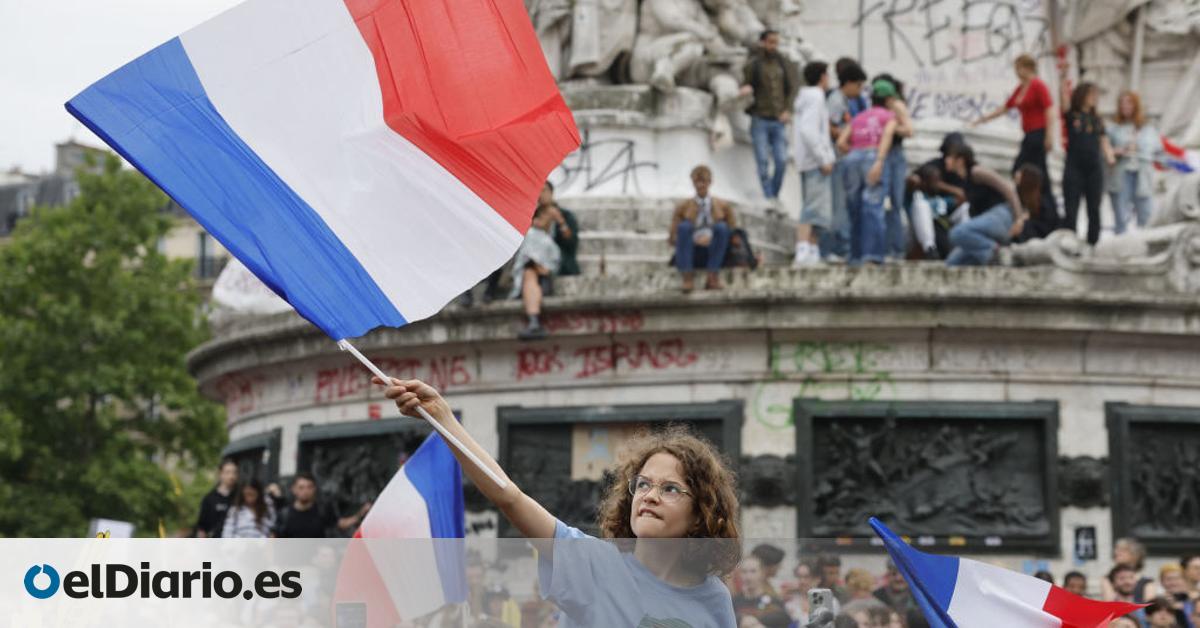
Europe is holding its breath. The EU is waiting for what happens this Sunday in the legislative elections in France, the second largest economy, a founding country of the club and a kind of moral leader in political terms. The country of “liberty, equality and fraternity” could enter uncharted territory if Marine Le Pen’s far-right National Rally (RN), a eurosceptic and xenophobe, wins.
According to the latest Ipsos estimates, the far-right party will go from its current 89 seats to between 175 and 205 seats, becoming the largest political force in Parliament for the first time – although far from the 289 that mark an absolute majority. In second place is the New Popular Front, the progressive alliance between La France Insoumise, the Communist Party, the Greens and the Socialist Party, which would win between 145 and 175 seats. The coalition led by President Emmanuel Macron suffers a tremendous blow, going from 247 seats to between 118 and 148 at best. Finally, Les Républicains, the traditional right, remains in fourth position with a range of between 57 and 67.
“In case that [Agrupación Nacional] If there is no absolute majority, which is what it seems, Parliament will be a real mess. I do not see that a coalition can be built with RN or with a left under the influence of Mélenchon. [líder de la Francia Insumisa]”, Jean-Yves Camus, political scientist, director of the Observatoire des Radicalités Politiques and one of the great French experts on the extreme right, explains to elDiario.es.
“I fear that we will enter into an institutional crisis that could become a constitutional crisis if, for example, Mélenchon asks Macron to resign, as he has already announced, and Macron refuses, which is most likely,” he says. “If it has already been difficult with an RN with 89 seats, it will be much more difficult with an RN almost three times as large.”
There is a high level of concern in Brussels, but silence has prevailed. This is largely because the Rassemblement National’s discourse is fuelled by Euroscepticism and also because of the neutrality in electoral processes that the European Commission is presumed to have.
The Socialists Pedro Sánchez and Olaf Scholz have been the heads of government who have most clearly sounded the alarm. “I hope for the good of France that the agreement between the parties and the mobilisation of progressive France will stop the far right, as we did in Spain. In the face of the far right there must be no colours but democrats,” said the Spaniard. Both have expressed concern about the rise of the far right and even more so in a country like France, whose weight in the EU is enormous and its voice is fundamental to the functioning of the machinery that is generally greased from the Franco-German axis that would be cracked with the nationalist far right on one side.
Those who have celebrated the rise of Le Pen’s party have been the leaders of the European far right, such as the Hungarian Prime Minister, Viktor Orbán, or the leader of the League, Matteo Salvini. Giorgia Meloni, who has achieved a certain whitewashing in the EU, especially from the EPP, as a valid interlocutor to build Ursula von der Leyen’s new majority against the old cordon sanitaire, has maintained a lower profile. The leader of the Fratelli d’Italia has rejected Le Pen’s invitation to form a ‘supergroup’ in the European Parliament and the rivalry for the hegemony of the far right has sharpened.
Meanwhile, in Paris, there is no electoral atmosphere, but there is a lot of fear. On the Place de la République, which has become a symbol of protests in the capital, the enormous statue is wearing a T-shirt with the colours of the NFP, encouraging the French to vote to prevent a far-right government. Of the 18 constituencies in the city – each of which sends one deputy to the Assembly – 10 have already been decided in the first round for candidates from the New Popular Front (NFP, for its initials in French) – if a candidate exceeds 50% of the vote there is no second round. In the other eight there is a tiebreaker, four of them with an advantage for the NFP and another four for Macron’s coalition. The far right practically does not exist in the capital and only one candidate is present in the second round.
The feeling is completely different when you leave Paris for the great black spot of the National Rally’s dominance. Amal, a Spaniard, is a civil servant in the town of Dreux as a Spanish teacher in a school. “I don’t need it, but a few months ago I got French nationality especially because I wanted to vote and I saw the rise of Marine Le Pen.” Many also remember that the last polls in 2022 gave RN between 20 and 50 seats and they ended up getting 89.
The election result could end an unusual, though not unprecedented, ‘cohabitation’ between liberal President Emmanuel Macron and a government led by a prime minister from another party. What is worrying in the EU is that this head of the executive is Jordan Bardella, Le Pen’s ‘dauphin’, who has used his years in the European Parliament to gain political popularity in France. Bardella has indicated that he would only be prime minister if his party wins an absolute majority, which does not seem likely.
“We have had difficult cohabitations between the Socialist Party and the conservatives with Mitterrand and Jacques Chirac, but both defended the rule of law. The big difference is that the National Rally wants to change the main values of our institutions and our constitution and that would end in a head-on clash with the president,” says Camus.
The consequences in Europe
Moreover, the weight of the far right could increase substantially in the EU if the National Rally takes power. Macron will continue to sit with the other leaders in the European Council, but the ministers will sit in the sectoral meetings of the EU Council. And if France joins Italy, the Netherlands, Hungary and the Czech Republic – all of them in the hands of the ultra-conservatives – they will be close to a blocking minority.
“While Macron would still attend European Council meetings, meet with his foreign counterparts and set the general direction of the European Union, it is the foreign and defence ministers who meet their international colleagues in Brussels. This could lead to contradictory messages from Paris,” notes Ulrike Franke, a researcher at the European Council of Foreign Relations (ECFR), in an article.
That would be a shock, especially coming from the country of diplomacy par excellence. Foreign and defence policy will continue to be shaped, in principle, by Macron, a convinced pro-European, but he will clash with the government of a party that openly opposes some key issues on the EU agenda. “The National Rally could be tempted to impose nationalist voices that Macron will find difficult to digest. These nationalist ministers could fight hard on key issues that are at odds with Macron’s policy but are central to his legacy,” analyse experts Célia Belin (ECFR) and Mathieu Droin (Centre for International and Strategic Studies).
“One of them is the enlargement of the European Union to include Ukraine, Moldova and the Western Balkans, a cause of which Macron has become one of the strongest defenders in Europe and which the National Rally strongly rejects,” they add.
“I am opposed to any enlargement of the European Union. I do not want to see French agriculture die, nor do I want the French to pay more and more taxes to finance the entry of new countries into the European Union,” Le Pen said recently in an interview in which she made a clear declaration of intent against one of the geostrategic decisions that the EU has committed to promoting in the remainder of the decade and which requires unanimity of the 27, like most changes in the community club related to integration, which would be more difficult with a Eurosceptic party in one of the main capitals.
For now, enlargement is more symbolic, but in the short and medium term the EU’s biggest concern is support for Ukraine against Russia, which requires consensus among all 27 on most issues. So far, they have managed to get around Orbán’s vetoes. And Meloni has joined the pro-Ukraine majority without questioning it. Bardella has also supported military aid for Kiev in the face of his leader’s ties to Putin. However, he has done so with nuances and in the European Parliament he voted against the budget that included aid of 50 billion for Ukraine, among others. This week, Putin’s government has given its support to Marine Le Pen’s party in the second round of elections.
The growing concern of these voices is growing, as the idea of bringing Donald Trump back to the White House is gaining ground at a time when the EU sees it as essential for Ukraine to resist Vladimir Putin’s attack.
A far-right government in France would mark a turning point in the relations that have existed in the EU until now, where a comfortable majority of Popular Party members, Socialists and Liberals have coexisted, but today they are also challenged by the emergence of a force that had always been isolated and which threatens to break up that coexistence.
Source: www.eldiario.es

